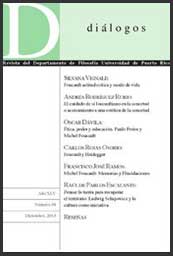Abstract
This article summarizes some of the main points of the decolonial turn, recognizing the work of Nelson Maldonado and Ramón Grosfoguel. The decolonial turn project works on what Aníbal Quijano named the modernity-coloniality: the power relations built in America's colonization, that persist even after the independence processes. The colonial domination is inseparable of the Modernity intellectual production, there is a complicity relation between the modernity and the coloniality. Nevertheless, the colonial power hierarchy is not fought by rejecting modernity. It requires a revaluation of the ontological, epistemological and ethical assumptions: of what defines the colonized beigns and what legitimated knowledge. Enrique Dussel help us to see that we need a transmodern perspective. The transmodernity goes beyond the modernity without dismissing it, but by including the voices and experiences of the «border» subjects. It is inside the coloniality-modernity power that border subjects resists and articulate others cosmo views and political projects that are excluded from the modern discourse.Downloads
Download data is not yet available.

